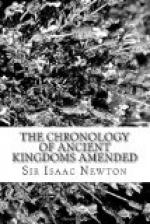Diodorus [258] saith in his 40th book, that in Egypt_ there were formerly multitudes of strangers of several nations, who used foreign rites and ceremonies in worshipping the Gods, for which they were expelled Egypt; and under Danaus, Cadmus, and other skilful commanders, after great hardships, came into Greece, and other places; but the greatest part of them came into Judaea, not far from Egypt, a country then uninhabited and desert, being conducted thither by one Moses, a wise and valiant man, who after he had possest himself of the country, among other things built Jerusalem, and the Temple._ Diodorus here mistakes the original of the Israelites, as Manetho had done before, confounding their flight into the wilderness under the conduct of Moses, with the flight of the Shepherds from Misphragmuthosis, and his son Amosis, into Phoenicia and Afric; and not knowing that Judaea was inhabited by Canaanites, before the Israelites under Moses came thither: but however, he lets us know that the Shepherds were expelled Egypt by Amosis, a little before the building of Jerusalem and the Temple, and that after several hardships several of them came into Greece, and other places, under the conduct of Cadmus, and other Captains, but the most of them Settled in Phoenicia next Egypt. We may reckon therefore that the expulsion of the Shepherds by the Kings of Thebais, was the occasion that the Philistims were so numerous in the days of Saul; and that so many men came in those times with colonies out of Egypt and Phoenicia into Greece; as Lelex, Inachus, Pelasgus, AEzeus, Cecrops, AEgialeus, Cadmus, Phoenix, Membliarius, Alymnus, Abas, Erechtheus, Peteos, Phorbas, in the days of Eli, Samuel, Saul and David: some of them fled in the days of Eli, from Misphragmuthosis, who conquered part of the lower Egypt; others retired from his Successor Amosis into Phoenicia, and Arabia Petraea, and there mixed with the old inhabitants; who not long after being conquered by David, fled from him and the Philistims by sea, under the conduct of Cadmus and other Captains, into Asia Minor, Greece, and Libya, to seek new seats, and there built towns, erected Kingdoms, and set on foot the worship of the dead: and some of those who remained in Judaea might assist David and Solomon, in building Jerusalem and the Temple. Among the foreign rites used by the strangers in Egypt, in worshipping the Gods, was the sacrificing of men; for Amosis abolished that custom at Heliopolis: and therefore those strangers were Canaanites, such as fled from Joshua; for the Canaanites gave their seed, that is, their children, to Moloch, and burnt their sons and their daughters in the fire to their Gods, Deut. xii. 31. Manetho calls them Phoenician strangers.




